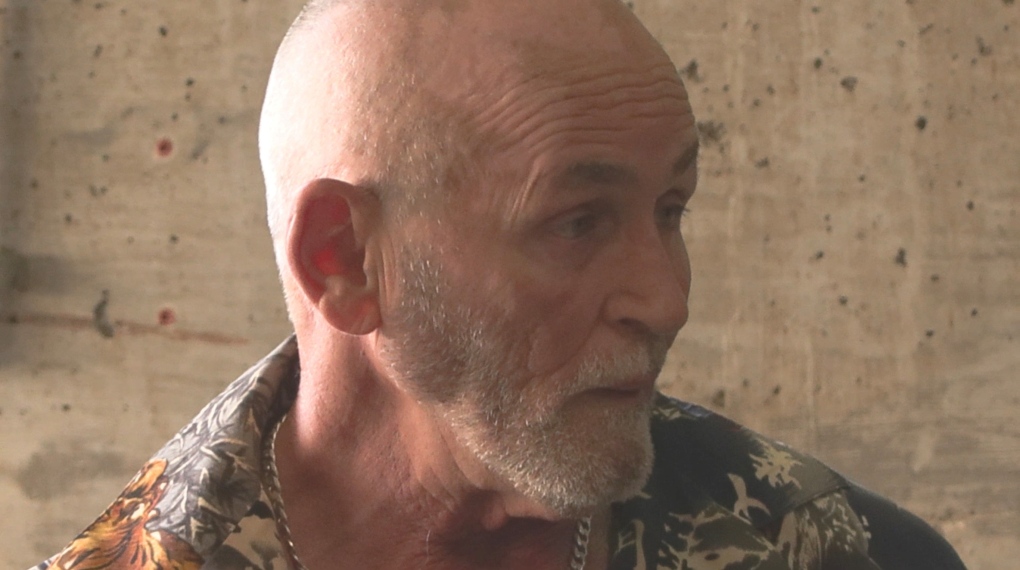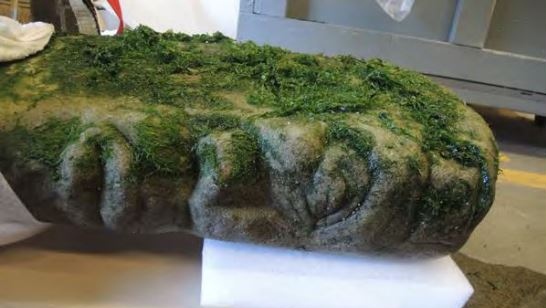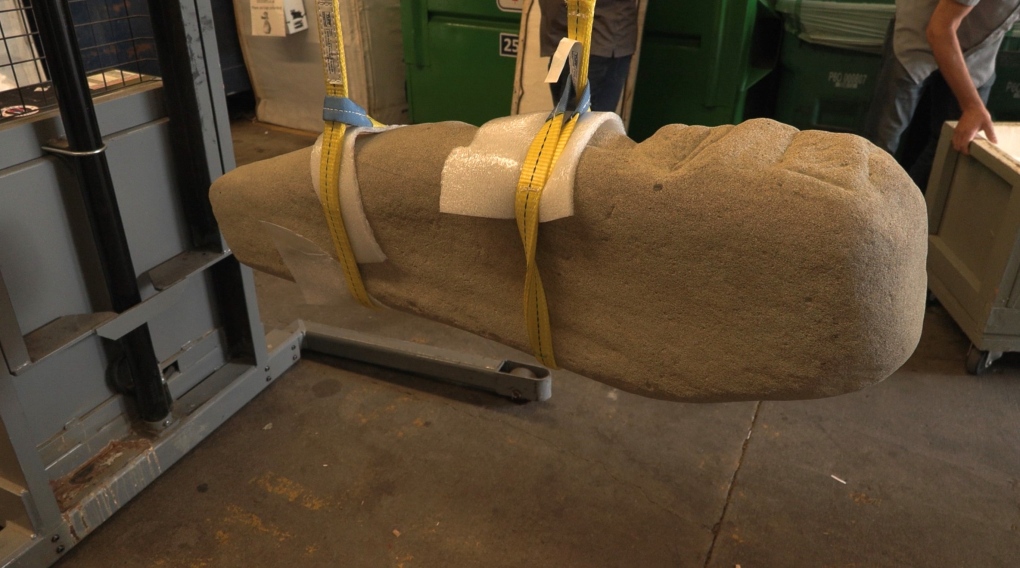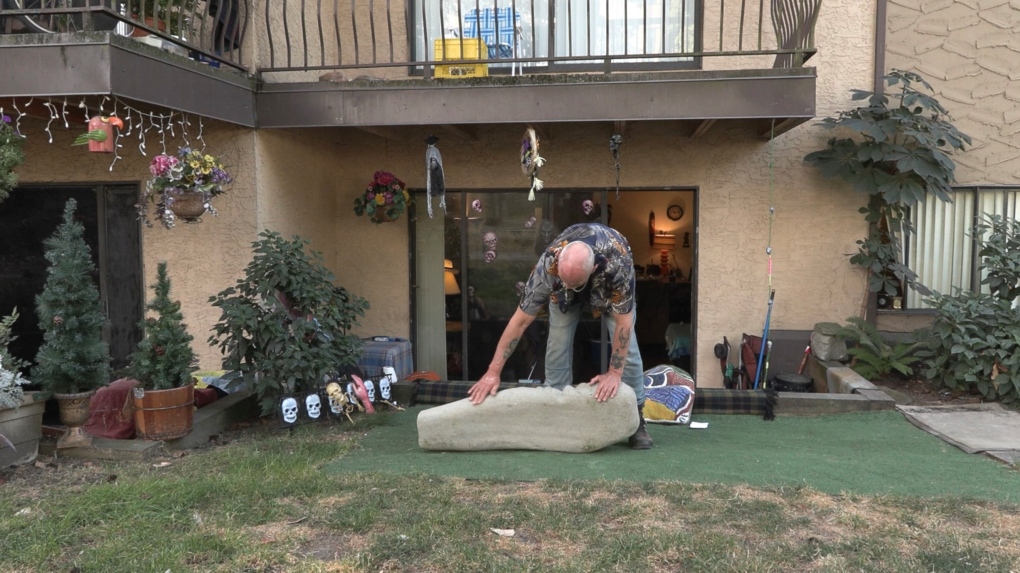Royal B.C. Museum apologizes after 2017 carving declared ancient Indigenous artifact
The Royal British Columbia Museum apologized Tuesday and admitted for the first time that one of its artifacts is not, in fact, a centuries-old Indigenous stone monument, as museum curators had claimed.
Rather, the stone was carved five years ago by a Victoria hobbyist with no ties to local Indigenous culture, despite the museum's grand assertions about the stone's historic significance to the First Peoples of Vancouver Island.
The museum clung to that ancient-origin story until Tuesday, when staff met with the local carver in the museum's underground loading dock and forklifted the stone into the back of his car to finally take home.
In a letter of apology, museum CEO Alicia Dubois said she was "relieved and pleased" to see the artwork returned to its rightful owner.
"I would like to express my gratitude for your patience as we navigated this unfamiliar territory and extend sincere apologies for the errors made during the process," Dubois wrote.
"I assure you that as a team, we have learned from this experience and are taking concrete measures to ensure similar errors are not made in future."
ORIGINS OF THE CARVING
It was raining in Victoria in January 2017 when Ray Boudreau, a night watchman for a security company, went to the beach with the carpenter's hammer and chisel he kept in the trunk of his car.
He had tooled leather bibles before, but never solid rock. Nonetheless, he found a piece of sandstone – weighing in excess of 100 kilograms – at the bottom of the bluff and started carving the human face that would go on to dupe researchers at B.C.'s foremost repository of natural and human history.
When Boudreau returned to the beach days later to finish his carving, the rock was gone. He figured someone took it, but more likely it was carried out to sea by a surging winter tide.
That's where it was recovered three years later by Grant Keddie, then curator of the Royal B.C. Museum's Indigenous collections and repatriation department, after receiving a tip about a strange carving spotted in the surf at low tide.
 Artist Ray Boudreau at the Royal B.C. Museum on Tuesday, Sept. 13, 2022. (CTV News)
Artist Ray Boudreau at the Royal B.C. Museum on Tuesday, Sept. 13, 2022. (CTV News)
'VERY SPECIAL RITUAL STONE PILLAR'
Internal communications obtained by CTV News show that Keddie and his team quietly set to work on restoring the carving and preparing a permanent gallery display for the "ritual stone pillar."
The planned installation would feature the carving set upright within a display case to "show the figure as it would have been seen centuries ago, partly in the ground," Keddie wrote in an email to a colleague.
The partially redacted documents, obtained through B.C.'s access-to-information law, proved the museum disregarded warnings about the carving's authenticity and pressed ahead with plans to present the stone as a watershed discovery for Indigenous culture in the province.
 The stone carving, shortly after it was recovered in July 2020, at the Royal B.C. Museum. (RBCM)
The stone carving, shortly after it was recovered in July 2020, at the Royal B.C. Museum. (RBCM)
Six months later, the museum issued a news release and published a lengthy article announcing the discovery of a "very special ritual stone pillar" that had been hewn centuries ago by the Indigenous inhabitants of southern Vancouver Island.
The announcement made national headlines and stoked excitement in the archaeological community.
But within 48 hours of the announcement, Boudreau, the carver, showed CTV News photos of his carving, which bore a striking resemblance to the carving the museum believed was used centuries ago "to change the weather" during seasonal ceremonies.
When CTV News published Boudreau's account of the carving later that day, the museum immediately scrubbed all mention of the discovery – including its press release, photographs and a lengthy essay written by Keddie, the curator – from its website without explanation.
Indeed, in the months that followed, all of Keddie’s research would be erased from the museum website, along with his employee profile and contact information.
Keddie, who had served as a leading curator at the museum for decades, was also removed from the B.C. government's staff directory, which lists contact information for current provincial employees.
 The carving is lifted into the back of a vehicle at the Royal B.C. Museum on Tuesday, Sept. 13, 2022. (CTV News)
The carving is lifted into the back of a vehicle at the Royal B.C. Museum on Tuesday, Sept. 13, 2022. (CTV News)
Spokespersons for the museum declined to comment on Keddie's departure on Tuesday, saying only that it was a human resources matter.
At no point during the two years when the carving sat in a crate in the museum's basement did anyone at the institution try to contact Boudreau about his claim.
'A LONG TIME COMING'
Keddie's departure was just the latest in a series of recent, high-profile exits among museum staff. Those exits include the ouster of president and CEO Jack Lohman amid a third-party investigation into workplace racism and mismanagement, and the voluntary departures of two Indigenous collections curators.
Janet Hanuse, the museum's vice-president of engagement and implementation of the Declaration on the Rights of Indigenous Peoples Act, would not say specifically what errors were made in the curatorial process or how the final determination of the artifact's origin was reached.
"It underwent some sort of investigation but then it stopped," Hanuse told CTV News. "There's been a lot of attention around it and I personally don't like things left unfinished so I'm happy to see closure."
 Ray Boudreau takes his carving home from the Royal B.C. Museum for the first time since creating it in 2017. (CTV News)
Ray Boudreau takes his carving home from the Royal B.C. Museum for the first time since creating it in 2017. (CTV News)
Leaving the museum with his carving Tuesday, Boudreau said he had "mixed feelings" about finally getting the artwork back all these years later, but he vowed to finish the carving as he intended.
"It's been a long time coming," Boudreau said. "But it would have been cool to visit it here at the museum and say, 'I did that.'"
CTVNews.ca Top Stories

Poilievre will do 'anything to win,' must condemn Alex Jones endorsement: Trudeau
Prime Minister Justin Trudeau is ramping up his attacks on Conservative Leader Pierre Poilievre as he promotes his government's federal budget.
'My stomach dropped': Winnipeg man speaks out after being criminally harassed following single online date
A Winnipeg man said a single date gone wrong led to years of criminal harassment, false arrests, stress and depression.
New evidence challenges the Pentagon's account of a horrific attack as the U.S. withdrew from Afghanistan: CNN exclusive
New video evidence uncovered by CNN significantly undermines two Pentagon investigations into an ISIS-K suicide attack outside Kabul airport, during the American withdrawal from Afghanistan in 2021.
'One of the single most terrifying things ever': Ontario couple among passengers on sinking tour boat in Dominican Republic
A Toronto couple are speaking out about their 'extremely dangerous' experience on board a sinking tour boat in the Dominican Republic last week.
All Alberta wildfires to date in 2024 believed to be human-caused: province
There are 63 wildfires burning in Alberta's forest protection area as of Wednesday morning and seven mutual aid fires, including one in the Municipal District of Peace.
Video shows suspects waving weapons, smashing glass in Toronto jewelry store robbery
Arrests have been made after five men were captured on video rampaging through a jewelry store in Toronto, waving weapons and smashing glass display cases.
Pilot proposes to flight attendant girlfriend in front of passengers
A Polish pilot proposed to his flight attendant girlfriend during a flight from Warsaw to Krakow, and she said yes.
Ottawa injects another $36M into fund for those seriously injured or killed by vaccines
The federal government has added $36.4 million to a program designed to support people who have been seriously injured or killed by vaccines since the end of 2020.
Ex-SNC executive sentenced to prison term in bridge bribery case
The RCMP says a former SNC-Lavalin executive has been sentenced to three and a half years in prison in connection with a bribery scheme for a bridge repair contract in Montreal.
































